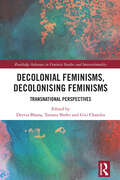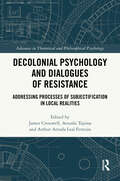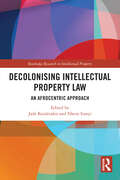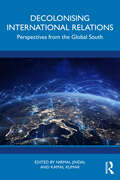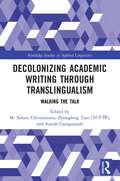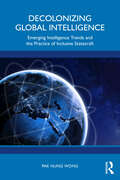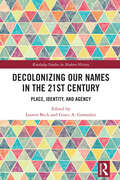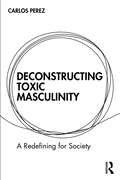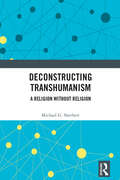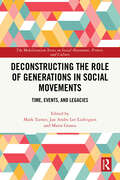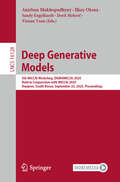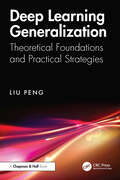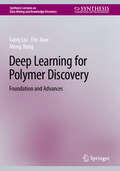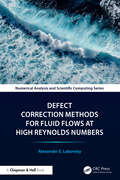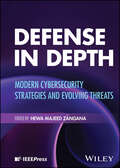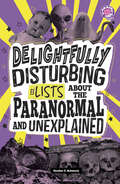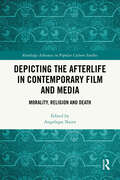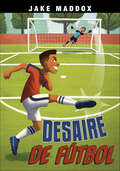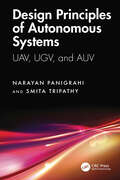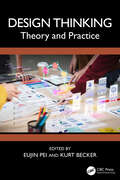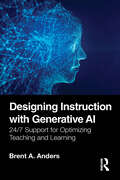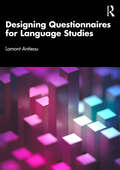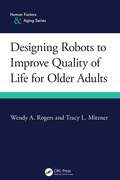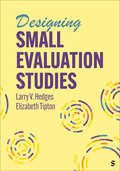- Table View
- List View
Decolonial Feminisms, Decolonising Feminisms: Transnational Perspectives (Routledge Advances in Feminist Studies and Intersectionality)
by Deevia Bhana Giti Chandra Tamara SheferThis book redefines feminist discourse by exploring the intersections of decolonial feminisms across various geopolitical contexts, emphasising the integration of local and indigenous narratives that challenge colonial epistemologies.The volume is organised into three thematic parts that critique traditional feminist frameworks, highlight innovative pedagogical methodologies, and showcase activism aimed at addressing intersectional inequalities. Each section features contributions from established scholars and emerging voices from both the Global North and the Global South, fostering interdisciplinary discussions that reflect a rich diversity of experiences. This approach not only enhances understanding of feminist thought but also promotes transformative practices that advocate for gender and social justice.The book is targeted at scholars, students, and activists in feminist studies, postcolonial theory, and social justice and is a must-read for those looking to expand their understanding of feminist thought. Its emphasis on collaboration and solidarity makes it a valuable resource for anyone interested in addressing the complex global issues influenced by colonial histories while envisioning a more equitable future.
Decolonial Psychology and Dialogues of Resistance: Addressing Processes of Subjectification in Local Realities (Advances in Theoretical and Philosophical Psychology)
by James Cresswell Atsushi Tajima Arthur Arruda Leal FerreiraInterweaving rich theory on dialogism, power, and resistance together with situated scenarios addressing the production of psychological knowledge, this book explores decoloniality as it interfaces with strategic fields in psychology.Current movements in global sentiment have raised important calls for decolonial action. In this volume an international set of authors come together to critically challenge power by considering how colonial mindsets develop and are retained. Drawing on dialogism inspired by Bakhtin, Vygotsky, and other leading thinkers of dialogicality, the book focuses on dialogue and how it is tied to the ability to think in ways outside colonial mindsets. It challenges approaches that run the risk of bypassing how fundamental colonialism has become for human thinking, and incorporates visions to consider how, both conceptually and methodologically, a postcolonial or decolonial psychology can be done. In so doing, it guides readers beyond the status quo to consider a program to improve psychology, formulate a new psychological culture, and bring about discussion beyond the permanent – yet generative – tension between liberating and subordinating psychologies.The book will be key reading for theoretical and critical psychology scholars and postgraduate students, particularly those interested in community engagement and decolonizing psychology. It will also be of interest to those engaged in research in Bakhtian studies, critical theory, and power studies.
Decolonising Intellectual Property Law: An Afrocentric Approach (Routledge Research in Intellectual Property)
by Jade Kouletakis and Nkem ItanyiThis book advocates for an Afrocentric approach to intellectual property (IP) law, using lessons from Nigeria’s past to encourage reform for the future of Africa’s legal IP landscape.Highlighting the Eurocentric influence on the history of intellectual property law in Africa, the book demonstrates how this contradicts traditional African community culture. This book makes the case for legitimising cultural expressions of traditional communities despite the western legal framework within which they exist, reimagining a decolonised IP framework whereby African histories are centred. Questioning the fundamentals of the current IP landscape, such as the concept of eligibility in copyright which developed alongside European technological advances, the book also details the role of the courts in resolving IP disputes. It highlights Africa as a powerhouse of original, autonomous innovation, values, and traditions which predate the West’s concept of intellectual property. It illustrates the African experience of intellectual property from a pro-African perspective as shared by African authors.This book will be of interest to researchers in the field of intellectual property, copyright, and patent law, as well as African law.
Decolonising International Relations: Perspectives from the Global South
by Kamal Kumar Nirmal JindalThis volume critically analyses the theories and concepts of international relations (IR), which will be instrumental in understanding IR from a non-western perspective. Owing to its emphasis on the need to decolonise the discipline of IR, alternate perspectives from the global South have been explored and discussed in detail.The book provides new insights to make the discipline more inclusive, universal and contributory to world peace and security. It lucidly enumerates on the concepts of state, sovereignty, power, conflict, security, diplomacy, human rights, development, market, inequalities, and migration from a non-Eurocentric lens, bringing distinct perspectives and experiences to the fore. Expanding on the Indian foreign policy of Vasudev Kutumbakam, it highlights India’s policy of multi-alliances and multilateralism and, also refers to India’s contributions during the COVID-19 pandemic and its drive to champion the cause of marginalised nations by reforming international institutions and pressing for development with sustainability. It is testament to India’s commitment to global security through cooperation and collective action.This book will be useful to the Departments of Political Science, Global Studies, International Studies, and South Asian studies. It will be an indispensable resource for researchers, social scientists and general readers interested to understand the theories and key concepts of IR, especially from an Indian perspective.
Decolonizing Academic Writing through Translingualism: Walking the Talk (Routledge Studies in Applied Linguistics)
by Suresh Canagarajah M. Sidury Christiansen Tian 田中锋 ZhongfengThis collection explores innovative ways to embody translingual practices in academic writing, showcasing how multilingual authors can effectively leverage their linguistic resources in research and publication. Recognizing that traditional academic writing often suppresses multilingual voices, this book advocates for a decolonized approach that embraces diverse linguistic expressions and knowledge representations for social change.This volume features perspectives from scholars across various disciplines and linguistic backgrounds presenting their unique visions of discursive, rhetorical, and linguistic diversity in academic writing. Each chapter showcases its respective author’s critical reflections on their language choices. This book offers a counterpoint to existing literature by making the case for the register known as “academic English” as a form both open to change and possible for accommodating diversity, empowering scholars to negotiate the register’s norms around their own languages and establish spaces for their own unique voices and identities.This book serves as a valuable resource for graduate students, faculty, and scholars interested in academic writing, TESOL, composition studies, language teaching and learning, and applied linguistics.
Decolonizing Global Intelligence: Emerging Intelligence Trends and the Practice of Inclusive Statecraft
by Pak Nung WongFrom September 11 to the calamitous withdrawal of United States troops from Afghanistan, Western intelligence has failed to negotiate the largest military and humanitarian crises across the world. This book proposes to decolonize global intelligence from the peripheries of the Global South and put forward a new intelligence practice of ‘inclusive statecraft’.It shows how dominant Western intelligence systems have failed to protect the very ideas they promised to uphold and the discrepancy between the West’s ‘Responsibility to Protect (R2P)’ liberalist doctrine and the realist on-the-ground complex reality as observed by the ‘Failure to Protect (F2P)’ scholarships. Drawing theoretical insights and empirical (both historical and contemporary) materials from a wide array of case studies of Western and non-Western intelligence settings and practices as well as their interactions, it argues that the next generation of global security and intelligence practitioners will necessitate genuine interracial, non-anthropocentric and cross-cultural inclusivity, especially the capability to take the non-Western intelligence cultures and their realist strategic thoughts seriously.This book will not just add new knowledge to the larger field of security and intelligence studies, but will also pioneer the relatively underdeveloped fields of comparative intelligence cultures, and interstellar intelligence/cultural studies. It will be indispensable for policymakers, bureaucrats and government officials.
Decolonizing Our Names in the 21st Century: Place, Identity, and Agency (Routledge Studies in Modern History)
by Lauren Beck Grace A. GomashieThis book combines different decolonial approaches from around the world to offer a roadmap for updating names and naming practices, restoring and protecting precolonial ones, and reimagining or recontextualizing the relationship between place, identity, and names.In a postcolonial context, naming often serves as a bitter reminder of past harms through commemorative naming practices, whether through a system of baptismal names or a former colony’s approach to dealing with the names that the colonizer left behind. This volume assembles authors who hail from formerly colonized regions of the Americas, Europe, Africa, and Asia to engage with this problem of decolonizing names in the twenty-first century from a global perspective. The book also points to what strategies have had more success than others while envisioning the tools needed for progress in the future.Offering a useful framework with approaches that can easily be used across other geographical contexts, this volume is suitable for scholars and students interested in decolonization, identity, and naming practices.
Deconstructing Toxic Masculinity: A Redefining for Society
by Carlos PerezThis accessible book explores toxic masculinity, looking at how to define it, and how we can and should challenge its spread. This book draws on Derrida’s deconstruction, using the philosophical lens to deconstruct what toxic masculinity means and to better understand its significance for our society. It focuses on how harmful aspects of masculinity spread, infiltrate, and intoxicate our societies and how existing structures allow aspects of harmful masculinity to become toxic. This book also features discussions and analysis of participants’ lived experiences of masculinities, alongside the author’s reflections. It explores the relevance of toxic masculinity in work environments, politics, relationships, and gender roles and seeks to challenge and mitigate its damages for everyone. Encouraging critical thinking and understanding of healthier ways of being for all, this timely book will be of interest to therapists, counselors, teachers, and practitioners of family studies. It will also be useful reading for students in the fields of psychology, gender studies, sociology, and related fields.
Deconstructing Transhumanism: A Religion Without Religion
by Michael G. SherbertDeconstructing Transhumanism: A Religion Without Religion challenges the widely held view that transhumanism—a movement advocating for the enhancement of human life through technology—is purely secular and scientific. Instead, this groundbreaking study reveals how transhumanist thought remains deeply shaped by religious ideas, particularly those rooted in Christianity. Drawing on the philosophy of Jacques Derrida, Michael G. Sherbert explores how religious concepts like the sacred, messianism, salvation, and transcendence quietly persist within transhumanist visions of the future—often without reflection on the potential dangers they carry.From artificial intelligence to the dream of digital immortality, this book uncovers how technological aspirations often mirror age-old religious hopes. Through a careful analysis of leading figures such as Ray Kurzweil, David Pearce, and Nick Bostrom, Sherbert shows that even the most futuristic goals often retain hidden religious structures—what Derrida calls a “religion without religion.”Spanning philosophical inquiry, ethical reflection, and cultural critique, Deconstructing Transhumanism invites readers to rethink the assumptions behind some of today’s most influential ideas about technology, progress, and the future. It offers a timely examination of the religious undercurrents shaping Western technological imaginaries—urging greater awareness of the powerful, and sometimes perilous, narratives we carry into our increasingly high-tech future.
Deconstructing the Role of Generations in Social Movements: Time, Events, and Legacies (The Mobilization Series on Social Movements, Protest, and Culture)
by Maria Grasso Mark Turner Jan Andre Lee LudvigsenAlthough questions of how a social group’s shared experiences growing up in particular historical and social contexts shapes their identities, including their political identities, have engaged sociologists of family, youth, citizenship, culture, and political change, few books have so far examined the specific role of generations and generational consciousness in social movement activism. As such, this is the first book to focus exclusively on issues of temporality, events, and generational legacies in social movements. In demonstrating how generational consciousness, and specific frames, narratives, and repertoires of contention are shaped by, and respond to, historical and contemporary meanings of major events and social transformations in different locations, new important questions on race, class, ethnicity, gender, sexuality, and citizenship are revealed at new, emerging critical junctures in the twenty-first century,With its high-quality chapters and transnational scope, this book will capture several key trends in the role of generations in social movements and explores topics including contemporary feminism, family, and intergenerational transmission, generationality and political change, rituals and social change, and Black politics and US democracy.This is an invaluable resource for students and academics with an interest in sociology, political science, and the study of social movements and social change, and for policymakers and readers with a general interest in intergenerational conflict and the challenges of engaging new youth generations in political and democratic structures and processes.
Deep Generative Models: 5th MICCAI Workshop, DGM4MICCAI 2025, Held in Conjunction with MICCAI 2025, Daejeon, South Korea, September 23, 2025, Proceedings (Lecture Notes in Computer Science #16128)
by Anirban Mukhopadhyay Sandy Engelhardt Ilkay Oksuz Yixuan Yuan Dorit MehrofThis book constitutes the proceedings of the 5th Workshop on Deep Generative Models for Medical Image Computing and Computer Assisted Intervention, DGM4MICCAI 2025, held in conjunction with the 28th International Conference on Medical Image Computing and Computer Assisted Intervention, MICCAI 2025, in Daejeon, South Korea, during September 2025.The 33 papers presented in this book were carefully reviewed and selected from 50 submissions. These papers deal with recent algorithmic developments, new results, and promising future directions in Deep Generative Models.
Deep Learning Generalization: Theoretical Foundations and Practical Strategies
by Liu PengThis book provides a comprehensive exploration of generalization in deep learning, focusing on both theoretical foundations and practical strategies. It delves deeply into how machine learning models, particularly deep neural networks, achieve robust performance on unseen data. Key topics include balancing model complexity, addressing overfitting and underfitting, and understanding modern phenomena such as the double descent curve and implicit regularization.The book offers a holistic perspective by addressing the four critical components of model training: data, model architecture, objective functions, and optimization processes. It combines mathematical rigor with hands-on guidance, introducing practical implementation techniques using PyTorch to bridge the gap between theory and real-world applications. For instance, the book highlights how regularized deep learning models not only achieve better predictive performance but also assume a more compact and efficient parameter space. Structured to accommodate a progressive learning curve, the content spans foundational concepts like statistical learning theory to advanced topics like Neural Tangent Kernels and overparameterization paradoxes.By synthesizing classical and modern views of generalization, the book equips readers to develop a nuanced understanding of key concepts while mastering practical applications.For academics, the book serves as a definitive resource to solidify theoretical knowledge and explore cutting-edge research directions. For industry professionals, it provides actionable insights to enhance model performance systematically. Whether you're a beginner seeking foundational understanding or a practitioner exploring advanced methodologies, this book offers an indispensable guide to achieving robust generalization in deep learning.
Deep Learning for Polymer Discovery: Foundation and Advances (Synthesis Lectures on Data Mining and Knowledge Discovery)
by Gang Liu Meng Jiang Eric InaeThis book presents a comprehensive range of topics in deep learning for polymer discovery, from fundamental concepts to advanced methodologies. These topics are crucial as they address critical challenges in polymer science and engineering. With a growing demand for new materials with specific properties, traditional experimental methods for polymer discovery are becoming increasingly time-consuming and costly. Deep learning offers a promising solution by enabling rapid screening of potential polymers and accelerating the design process. The authors begin with essential knowledge on polymer data representations and neural network architectures, then progress to deep learning frameworks for property prediction and inverse polymer design. The book then explores both sequence-based and graph-based approaches, covering various neural network types including LSTMs, GRUs, GCNs, and GINs. Advanced topics include interpretable graph deep learning with environment-based augmentation, semi-supervised techniques for addressing label imbalance, and data-centric transfer learning using diffusion models. The book aims to solve key problems in polymer discovery, including accurate property prediction, efficient design of polymers with desired characteristics, model interpretability, handling imbalanced and limited labeled data, and leveraging unlabeled data to improve prediction accuracy.
Defect Correction Methods for Fluid Flows at High Reynolds Numbers (Chapman & Hall/CRC Numerical Analysis and Scientific Computing Series)
by Alexander E. LabovskyDefect Correction Methods for Fluid Flows at High Reynold’s Numbers presents the mathematical development of defect correction methods (DCM) in application to fluid flow problems in various settings. We will show several approaches to applying the DCM ideas in computational fluid dynamics (CFD) – from a basic idea of controlling the flow by the means of increased diffusion, to the state-of-the-art family of novel, DCM-based turbulence models. The main idea of the methods presented in this book, is to use defect correction in turbulence modelling; additionally, several methods will also be presented, that aim at reducing the time discretization error.Features · Provides a road map, starting from the ideas of minimally invasive controlling of turbulent flows, to the ways of improving the existing regularization techniques with DCM, to the ideas of ‘full defect correction’ in both space and time and, finally, to the more complex embedding of the DCM into turbulence modelling by the ‘correction’ of the whole turbulence model· Can be used for teaching a topics course on a Masters or Ph.D. level. It is even more suitable as a reference for CFD theorists and practitioners, with most of the methods being minimally invasive and, therefore, easy to implement in the existing/legacy codes· Discusses the current challenges in turbulence modelling with defect correction, showing several possible directions for future developments. Two source codes are provided – one for a regularization technique and another for a novel turbulence model – in order to give an interested researcher a quick start to the topic of DCM in CFD.
Defense in Depth: Modern Cybersecurity Strategies and Evolving Threats
by Hewa Majeed ZanganaUp-to-date reference on the evolving landscape of cybersecurity, focusing on strategies that integrate AI, blockchain, and human factors Defense in Depth delivers a comprehensive guide to the rapidly developing field of digital threats and defenses. This book examines how defense-in-depth approaches integrate multiple layers of security to protect against a wide range of threats; how AI technologies are being utilized for threat detection, response, and prediction; and how blockchain technology can be leveraged to enhance security measures, particularly in ensuring data integrity and securing transactions. Case studies of significant cyberattacks are included throughout the text to elucidate key concepts. The book discusses additional topics such as: The critical importance of cybersecurity in today’s interconnected world and the historical evolution of cyber threats, highlighting modern attack vectorsCore principles of defense, detailing layered security measures across networks, applications, data, and endpointsHuman factors, often the weakest link in cybersecurity, with strategies for mitigating risksMachine learning and neural networks and their usage in AI-driven security solutions across finance, healthcare, and governmentAdvanced defense techniques, practical applications, and future directions in cybersecurity Defense in Depth is an essential reference on the state of the art in the field for cybersecurity professionals, IT practitioners, and researchers. It is also an excellent learning aid for advanced students in cybersecurity, particularly those in graduate programs.
Delightfully Disturbing Lists About the Paranormal and Unexplained
by Heather E. SchwartzSpooky season can be all year long when the scariest, most spine-tingling facts are collected in this book of delightfully disturbing lists. Chapters make the content event more digestible. Full-color images and inviting designs will engage readers’ minds and get them excited to learn more.
Depicting the Afterlife in Contemporary Film and Media: Morality, Religion and Death (Routledge Advances in Popular Culture Studies)
by Angelique NairnWhat lies beyond death? This book brings together a diverse collection of scholarly voices to explore how popular culture imagines—and reimagines—the afterlife. Drawing from film, television, video games, literature, advertising, and digital technologies, this book examines how narratives about Heaven and Hell, ghosts and gods, memory and immortality shape contemporary understandings of morality, death, and what may come after.From Pixar’s Coco to The Good Place, Ghostbusters, Upload, and Westworld, these chapters interrogate the enduring power of afterlife narratives to provide existential comfort, moral guidance, and cultural critique. Whether through the lens of theology, philosophy, or secular imagination, contributors consider how popular media blurs the sacred and the profane, challenging dogma, reframing ethics, and offering new possibilities for how we remember the dead and live among the living.Spanning topics such as queer love in the afterlife, Indigenous cosmologies, digital resurrection, and the theological implications of robots, Depicting the Afterlife in Contemporary Film and Media: Morality, Religion and Death is a timely exploration of how the afterlife continues to haunt and inspire modern culture.Essential reading for scholars of media studies, religious studies, cultural theory, and anyone fascinated by humanity’s oldest and most enduring question: what happens when we die?
Dermoscopy of the Hair and Nails 3e
by Antonella Tosti Andrea SechiThis new edition of a bestselling text almost amounts to a completely new book, with over 750 figures of common and uncommon disorders, including new chapters on trichoscopy of hair transplantation, teletrichoscopy, and trichoscopy of the shaved scalp. The chapters also list the key clues that are important to help the practitioner reach the correct diagnosis about problems with hair or nails."Numerous high-quality photos are helpful in demonstrating key features" (Doody’s Reviews) [of the previous edition]
Desaire de fútbol
by Jake MaddoxDespués de trabajar duro en la temporada baja, Quincy está emocionado de ascender a un equipo de fútbol de primer nivel y jugar con su amigo Will. Pero el resto de sus nuevos compañeros de equipo en los Vipers no están tan entusiasmados. Le dan la espalda a Quincy, lo que le dificulta encontrar su ritmo. Pero pronto, Quincy comienza a ganarse algo de respeto. Entonces su entrenador lo cambia a la alineación titular y mueve a Will al banco. ¿Podrá Quincy encontrar una manera de que Will vuelva al juego? ¿O su amistad flaqueará por el repentino desaire futbolístico? ¡Descúbrelo en este emocionante libro de capítulos fácil de leer de Jake Maddox! After working hard in the off-season, Quincy is thrilled to move up to a top-level soccer team and play with his friend Will. But the rest of his new teammates on the Vipers aren&’t so excited. They give Quincy the cold shoulder, making it difficult for him to find his groove. But soon, Quincy begins to earn some respect. Then his coach shifts him into the starting lineup—and moves Will to the bench. Can Quincy find a way to get Will back in the game? Or will their friendship falter over the sudden soccer snub? Find out in this exciting, easy-to-read chapter book by Jake Maddox!
Design Principles of Autonomous Systems: UAV, UGV, and AUV
by Narayan Panigrahi Smita TripathyThis book explains unmanned systems including Unmanned Aerial Vehicles (UAVs), Autonomous Underwater Vehicles (AUVs) and Unmanned Ground Vehicles (UGVs). It also details system and subsystem compositions and their basic design. The components/subcomponents, employed payloads and sensors, and communication systems used to compose the autonomous system are discussed. It examines generic applications of these unmanned systems including specific missions for which they are employed. Other topics like swarm of drone, anti-drone system, and some algorithms used in navigation and communication of the drone are also discussed.Some key features: Helps readers understand nuances of autonomous systems on land, in air, and in sea. Explains pertinent design principles, sensors, and communication system. Lays the foundation for crafting, designing, and deploying autonomous systems for different applications. Reviews algorithms, computing, control and technology stacks required for design of UAS. Discusses software and navigation aspects of autonomous systems with the concepts of SLAM. This book is aimed at graduate students and researchers in mechatronics engineering, systems and sensors, systems and control, and aerospace engineering.
Design Thinking: Theory and Practice
by Kurt Becker Eujin PeiThis book aims to provide readers with an in-depth understanding of design thinking by documenting the personal insights of professionals and practitioners from a wide range of disciplines. Design Thinking: Theory and Practice refers to a series of cognitive, strategic, and practical steps used during the process of designing, and the context of how people reason when they engage with solving problems. The scope of this book focuses on topics such as problem-solving, systems thinking, innovation, and the role of design in product design and services. This book is unique as it brings together "stories" from both academics’ and practitioners’ perspectives, enabling readers to view design thinking from many different perspectives that can be applied in every-day life situations or for organizations when developing plans and policies. This book would be essential reading for design engineers, industrial designers, and mechanical engineers who have interest in design thinking.
Designing Instruction with Generative AI: 24/7 Support for Optimizing Teaching and Learning
by Brent A. AndersDesigning Instruction with Generative AI offers a novel set of tools and strategies for leveraging generative AI to create engaging and personalized learning experiences. While instructional designers are a tremendous asset to higher education, not all colleges or universities have the robust staff needed to support all instructors on staff or large student populations. Drawing on a wealth of research, professional experience, and strategic insights, this book equips new and seasoned teaching faculty and trainers with step-by-step directions on how freely accessible artificial intelligence software can assist with all aspects of the course creation and instruction process and cater to the needs of diverse learners. Each chapter offers forward-thinking and empirically validated ways to help faculty create and improve instructional materials, course design, and learning environments while supporting their digital literacies. Rather than introduce AI as a means of outsourcing subject-area expertise, critical thinking, or cognitive processes, the author instead emphasizes its potential to build on traditionally honed knowledge and foundational instructional design practices. From optimizing course alignment and accessibility practices to fostering active learning, motivation, and engagement, educators will find new solutions to common teaching and learning challenges with greater efficiency in time and capacity.
Designing Questionnaires for Language Studies
by Lamont AntieauDesigning Questionnaires for Language Studies is a guide to the design and use of questionnaires for empirical linguistic research, particularly in the areas of dialectology, sociolinguistics, and linguistic anthropology. Whether completed via written correspondence or through interviewing, questionnaires play an essential role in linguistic research. Yet, the design of questionnaires is rarely taught formally, leaving researchers to learn effective design in practice. This practical and accessible text offers structured, step-by-step guidance to provide researchers with the skills they need to make the most of questionnaire-based research. It also provides a history of the use of questionnaires in linguistic research and critically examines the assumptions and motivations inherent in their creation and administration, as well as that of the questions that populate them, and discusses how biases can negatively affect the outcome of the research itself. Experience using these tools in the field has led to their refinement over time. Armed with this knowledge, readers can make informed decisions about how to structure their own questionnaires as they embark on linguistic investigations or use it to better understand the results of previous research that has relied on questionnaires for data collection.
Designing Robots to Improve Quality of Life for Older Adults (Human Factors and Aging Series)
by Wendy A. Rogers Tracy L. MitznerWith adults over sixty becoming an ever-increasing proportion of the global population, the challenge of accommodating the needs, preferences, and abilities, of this heterogeneous population has increased. One such method is with robots, which can be used to support everyday activities for older adults and enhance their quality of life. Older adults have been found to be quite open to the idea of interacting with robots, albeit with preferences for the nature of the task they want the robots to do. This book provides a comprehensive state-of-the-art review of the topic of designing robots for older adults.This book translates research on aging, human factors, and human-robot interaction (HRI) into guidance that will be usable for practitioners who design robots for a range of applications. It offers a framework for HRI with a focus on personal characteristics, robot functionality, task demands, and interaction context. The application of this HRI framework for older adults provides the basis for the book. It covers the fundamentals of aging, a review of the different types of robots available now and in the future, the known facilitators and barriers for adoption and the potential of robots for different everyday activities including social engagement, health and wellness, home maintenance and security. Throughout, the authors emphasize the need to follow fundamental human factors processes and participatory design approaches that engage older adults in the design process, thus allowing the reader a thorough and contemporary understanding of robots as an essential future for assisting an aging population.Designing Robots to Improve Quality of Life for Older Adults is intended for a broad professional audience, especially the design community, gerontologists, and human factors/ergonomics practitioners. It will also be suitable for students at the undergraduate and graduate level as a supplementary textbook for courses in human factors, design for aging, and HRI.
Designing Small Evaluation Studies
by Larry V. Hedges Elizabeth Tipton"The book will be an important addition to instruction in designs for causal inference in the field of education. It is long overdue." - Thomas J. Lipscomb, The University of Southern Mississippi This text describes how to design and analyze small efficacy or evaluation studies, typically carried out as part of the development of programs or interventions in areas such as education. The problem facing many researchers is how to design a study that is as small as possible, yet big enough to yield relatively unambiguous evidence about an intervention’s average effect. This text begins with an overview of validity, causal inference, statistics, effect sizes, and measurement. The authors then focus on designs for small, randomized trials, followed by a section on non-randomized causal designs: here they focus on three designs most useful for small studies including the non-equivalent control group, difference-in-difference, and interrupted time series designs. The final section summarizes the book, compares designs, discusses approaches to choosing a design, and provides guidance on reporting. Five case examples are used throughout the book to illustrate the material and there is a glossary of terms and concepts.
